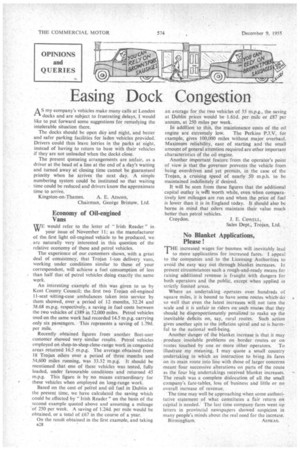Easing Dock Congestion
Page 62

If you've noticed an error in this article please click here to report it so we can fix it.
A S my company's vehicles make many calls at London " docks and are subject to frustrating delays, I would like to put forward some suggestions for remedying the intolerable situation there.
The docks should be open day and night, and better and safer parking facilities for laden vehicles provided. Drivers could thus leave lorries in the parks at night, instead of having to return to base with their vehicles if they are not unloaded when the docks close.
The present queueing arrangements are unfair, as a driver at the head of a line at the end of a day's waiting and turned away at closing time cannot be guaranteed priority when he arrives the next day. A simple numbering system could be instituted so that waiting time could be reduced and drivers know the approximate time to arrive.
Kingston-on-Thames. A. E. ADAMS,
Chairman, George Bristow, Ltd.
Economy of Oil-engined Vans
WE would refer to the letter of Irish Reader" inyour issue of November 11; as the manufacturer of the first light oil-engined vehicle to be produced, we are naturally very interested in this question of the relative economy of these and petrol vehicles.
The experience of our customers shows, with a great deal of consistency, that Trojan 1-ton delivery vans, working under conditions similar to those of your correspondent, will achieve a fuel consumption of less than half that of petrol vehicles doing exactly the same work.
An interesting example of this was given to us by Kent County Council; the, first two Trojan oil-engined 11-seat -sitting-case ambulances taken into service by them showed, over a period of 12 months, 32.24 and 38.68 m.p.g. respectively, a saving in fuel costs between the two vehicles of £389 in 52,000 miles. Petrol vehicles used on the same work had recorded 14.5 m.p.g. carrying only six passengers. This represents a saving of 1.79d. per mile.
Recently obtained figures from another fleet-user customer showed very similar results. Petrol vehicles employed on shop-to-shop close-range work in congested areas returned 16.5 m.p.g. The average obtained from 18 Trojan oilers over a period of three months and 54,600 miles running, was 33.32 m.p.g. it should be mentioned that one of these vehicles was tested, fully loaded, under favourable conditions and returned 45 m.p.g. This figure is by no means extraordinary for these vehicles when employed on long-range work.
Based on the cost of petrol and oil fuel in Dublin at the present time, we have calculated the saving which could be effected by " Irish Reader" on the basis of the second example quoted above and assuming a mileage of 250 per week. •A saving of 1.24d. per mile would be obtained, or a total of £67 in the course of a year.
On the result obtained in the first example, and taking B28 an average for the two vehicles of 35 m.p.g., the saving at Dublin prices would be 1.61d. per mile or £87 per annum, at 250 miles per week.
In addition to this, the maintenance costs of the oil• engine are extremely low. The Perkins P.3.V, for example, gives 100,000 miles without major overhaul. Maximum reliability, ease of starting and the small amount of general attention required are other important characteristics of the oil engine.
Another important feature from the operator's point of view is that the governor prevents the vehicle from being overdriven and yet permits, in the case of the Trojan, a cruising speed of nearly 50 m.p.h, to be maintained indefinitely if desired.
It will be seen from these figures that the additional capital outlay is well worth while, even when comparatively low mileages are run and when the price of fuel is lower than it is in England today. It should also be borne in mind that oilers maintain their value muck better than petrol vehicles.
Croydon. J. E. COWELL,
Sales Dept., Trojan, Ltd.
No Blanket Applications, Please !
1HE increased wages for busmen will inevitably lead to more applications for increased fares. I appeal to the companies and to the Licensing Authorities to avoid the easy way out through blanket increases. In present circumstances such a rough-and-ready means for raising additional revenue is fraught with dangers for both operators and the public, except when applied in strictly limited areas.
Where an undertaking operates over hundreds of square miles, it is bound to have some routes which do so well that even the latest increases will not turn the scale and it is unfair to riders on such rout's that they should be disproportionately penalized to make up the inevitable deficits on, say, rural routes. Such action gives another spin to the inflation spiral and so is harmful to the national well-being.
Another danger of the blanket increase is that it may produce insoluble problems on border routes or, on routes touched by one or more other operators. To illustrate my meaning, 1 may quote a small country undertaking in which an instruction to bring its fares on its main route into line with those of larger concerns meant four successive alterations on parts of the route as the four big undertakings received blanket increases. The result was a complete dislocation of all the small company's fare-tables, loss of business and little or no overall increase of revenue.
The time may well be approaching when some authoritative statement of what constitutes a fair return on capital is needed. The last time company fares went up letters in provincial newspapers showed suspicion in many people's minds about the real need for the increase.
Birmingham. AENEAS.




















































































































